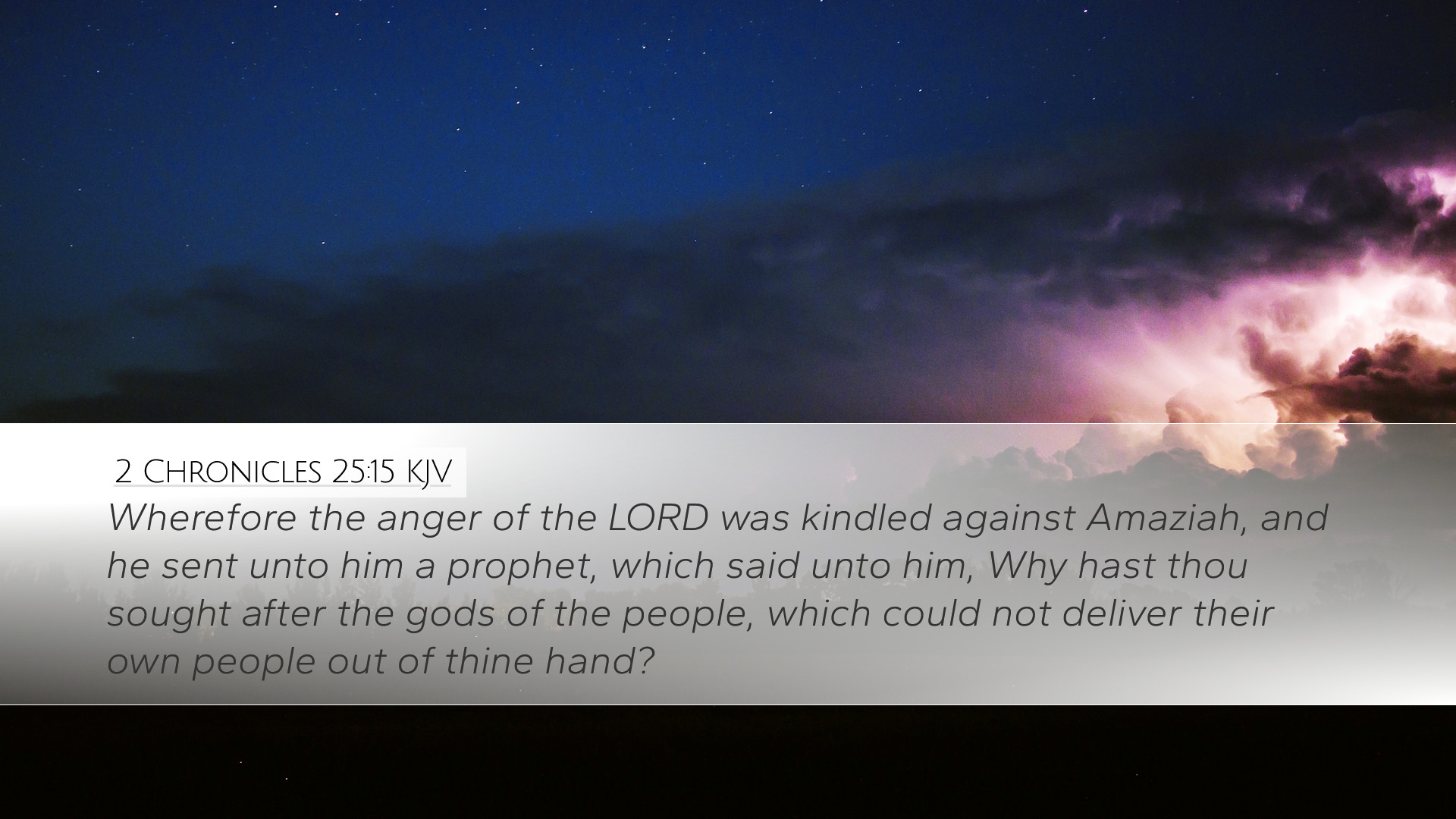Commentary on 2 Chronicles 25:15
This verse deals with the anger of the Lord directed towards King Amaziah of Judah due to his idolatrous actions. It serves as a poignant reminder of the consequences of turning away from God, as reflected through the history of Israel and Judah.
Contextual Background
2 Chronicles 25 records the reign of King Amaziah, who displays a mixture of fidelity to God and a propensity for idolatry. He begins his reign positively, but this changes as he deviates into practices contrary to the Law. Understanding the context in which this verse is placed is crucial for effective interpretation.
Exegetical Analysis
Verse Text: “Wherefore the anger of the Lord was kindled against Amaziah, and he sent unto him a prophet, which said unto him, Why hast thou sought after the gods of the people, which could not deliver their own people out of thine hand?”
Reflection on God’s Anger
Matthew Henry highlights that God's anger arises from Amaziah's choices. It emphasizes that God's patience has limits, and His holiness must be maintained. Amaziah's actions prompted a divine response that is critical for understanding God's character.
Idolatry and Its Consequences
- Spiritual Betrayal: Albert Barnes notes that seeking foreign gods equals spiritual infidelity against the Lord, who had delivered them. This reflects a grave misunderstanding of God's power.
- Divine Intervention: Adam Clarke points out that God sends prophets to admonish His people as a mercy, allowing them to return before judgement comes.
- Judgment as a Theme: The verse elucidates the recurrent theme in Chronicles of God's judgment against those who forsake Him, reinforcing the idea that idolatry leads to divine displeasure.
The Role of Prophecy
The sending of a prophet illustrates God's continued outreach to His people. This act serves:
- To Warn: Prophets serve to call people back to righteousness, providing both warning and opportunity for repentance.
- To Guide: Their message is not just reprimanding but also enlightening, revealing God’s expectations for His leaders as exemplified in Amaziah's case.
Theological Insights
From this verse, we gather essential theological principles:
- The Nature of God: God is just and does not overlook sin. His anger symbolizes His holiness in the face of evil.
- Human Responsibility: Amaziah's choices highlight the importance of personal responsibility in the covenant relationship with God.
- The Call to Repentance: God’s desire is always towards reconciliation, as indicated by His sending prophets even amidst transgression.
Practical Applications for Today
This passage yields significant lessons for contemporary believers:
- Idolatry Today: Just as Amaziah turned to foreign gods, modern believers must examine their lives for anything that competes with God’s rightful place.
- Listening to Voices of Warning: The church is called to heed prophetic voices today—those who speak truth into our lives, whether through scripture, teachings, or confrontations.
- Understanding God’s Discipline: Believers are reminded that the Lord's anger is not arbitrary but rooted in His nature and love, prompting them to realign with His will.
Conclusion
2 Chronicles 25:15 illustrates the gravity of turning away from God through the example of Amaziah. The passage reminds pastors, students, and scholars of the importance of fidelity to God, the consequences of idolatry, and the opportunity for repentance. By understanding the character of God, the role of prophecy, and the implications for contemporary faith practice, readers are called to a deeper commitment to following the Lord wholeheartedly.


